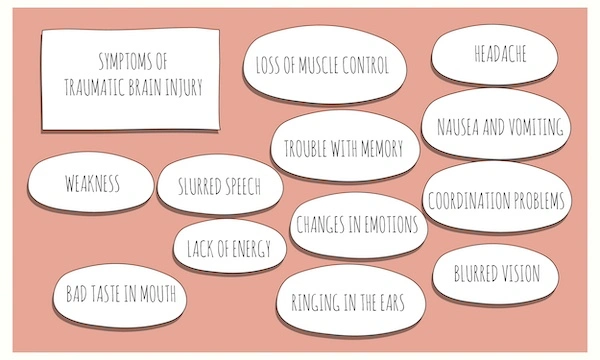A traumatic brain injury is a brain injury caused by external head trauma. Traumatic brain injuries (TBIs) can occur in a variety of situations, such as car accidents and falls. While some symptoms may be immediately noticeable, others can develop over time. Symptoms of traumatic brain injuries can include headaches, dizziness, and blurred vision. Seeking medical care quickly is essential.
If you or a loved one has suffered a TBI in an accident, our traumatic brain injury lawyers at McDougall Law Firm can help you pursue the compensation you deserve. Our attorneys have won millions of dollars for clients in South Carolina. Contact us today for a free case evaluation!
What Are the Symptoms of Traumatic Brain Injuries?
Symptoms of traumatic brain injuries can vary depending on the severity of the injury and the area of the brain that has been affected. TBI symptoms can appear immediately following an accident or develop over time. You should seek medical attention after any head trauma, even if symptoms seem mild at first.
Physical Symptoms
Physical symptoms of a TBI can include:
- Headaches: One of the most common symptoms, headaches can range from mild to severe and may persist for weeks or months after the injury.
- Dizziness or Balance Issues: People with TBIs often report feeling dizzy or experiencing difficulty maintaining their balance. This can make everyday activities challenging.
- Nausea or Vomiting: Some individuals may experience nausea or vomiting, especially soon after the injury.
- Fatigue: Many TBI patients feel excessively tired, sometimes leading to sleep disturbances, including trouble falling asleep or staying awake during the day.
- Sensitivity to Light or Sound: Individuals with TBIs may develop sensitivity to light or loud noises, making them uncomfortable in many environments.
- Seizures: In more severe cases, seizures can occur, indicating a significant injury to the brain that may require immediate medical intervention.
Cognitive and Emotional Symptoms
The cognitive and emotional impact of a TBI can also be significant, affecting a person’s ability to think, remember, and regulate emotions. These symptoms can include:
- Memory Loss: Short-term or long-term memory can be impaired, and individuals may struggle with recalling events before or after the injury.
- Confusion or Disorientation: People with TBIs often report feeling confused or disoriented, especially in the days following the injury.
- Difficulty Concentrating: A reduced ability to focus or maintain attention is common, which can make working, studying, or even carrying on a conversation challenging.
- Mood Swings and Irritability: TBIs can lead to sudden changes in mood, ranging from depression and anxiety to irritability and emotional outbursts.
- Personality Changes: Some individuals may experience noticeable changes in their personality, including increased aggression or a lack of emotional regulation.
Severe Symptoms
In cases of severe traumatic brain injury, the symptoms can be more pronounced and life-threatening. Severe symptoms of traumatic brain injuries can include:
- Loss of Consciousness: A person may lose consciousness for several minutes or even hours after the injury.
- Pupil Dilation: One or both pupils may become dilated and unresponsive to light.
- Coma: In extreme cases, a person may be unable to wake up from a coma or may remain in a persistent vegetative state.
- Weakness or Paralysis: A TBI can cause weakness or paralysis in various parts of the body, depending on which areas of the brain are affected.
How Can a Traumatic Brain Injury Lawyer Help Victims?
Navigating the complexities of a traumatic brain injury case can be overwhelming, especially when dealing with the effects of the injury itself. A traumatic brain injury lawyer can help accident victims and their families seek the maximum compensation.
Gathering Evidence for a Strong Case
One of the most critical roles of a traumatic brain injury lawyer is gathering evidence to build a strong case. This can involve working with medical professionals to document the extent of the injury, obtaining witness testimony, and reviewing accident reports. A TBI lawyer will also consult with experts who can testify about the long-term effects of the injury and how it has impacted the victim’s life.
Settlement Negotiation
A brain injury attorney will negotiate with insurance companies or at-fault parties to reach a fair settlement. Insurance companies often aim to minimize payouts. Having a skilled TBI lawyer on your side is crucial. They will fight to ensure the settlement covers all medical expenses, lost wages, pain and suffering, and other damages.
Representation in a Lawsuit
If a fair settlement cannot be reached through negotiations, your TBI lawyer will be prepared to represent you in a personal injury lawsuit. They will present the evidence in court, advocate for your rights, and work to secure a verdict that fairly compensates you for the harm caused by the injury.
What Compensation Can You Recover in a TBI Case?
If you’ve suffered a traumatic brain injury due to someone else’s negligence or intentional actions, you may be entitled to compensation. The types of damages awarded in TBI cases can vary.
Traumatic brain injury car accident settlements can reach millions of dollars.
Medical Bills
The cost of medical treatment for a traumatic brain injury can be astronomical, particularly for individuals who require surgery, rehabilitation, long-term care, or therapy. Compensation for medical bills includes both past and future treatment expenses.
Lost Wages and Lost Earning Potential
In many cases, a TBI can prevent someone from working, either temporarily or permanently. Victims may lose wages if they cannot return to their jobs right away or if they are permanently disabled and unable to work in the same capacity as before. Lost earning potential can also be compensated if the injury significantly reduces the person’s ability to earn income in the future.
Caregiving Expenses
Severe traumatic brain injuries may require ongoing care from a professional caregiver, family member, or healthcare provider. Compensation in a TBI case can cover short-term and long-term caregiving expenses.
Pain and Suffering
Pain and suffering are often included in personal injury settlements for traumatic brain injuries. This compensates victims for the physical pain, emotional distress, and psychological effects caused by the injury. Victims of severe TBIs may experience lasting pain or emotional trauma, which can be addressed through these types of damages.
Punitive Damages
Victims can seek punitive damages in a personal injury lawsuit if the defendant’s actions were intentional or especially reckless. These damages are intended to punish the at-fault party. For example, if the defendant was driving under the influence, the court may award punitive damages ot the victim.
Contact McDougall Law Firm for a Free Consultation
Traumatic brain injuries can have a profound impact on a person’s life, causing physical, cognitive, and emotional challenges. If you or a loved one has suffered a TBI, it’s important to understand the symptoms and seek assistance from a qualified traumatic brain injury lawyer.
The experienced legal team at McDougall Law Firm in Beaufort, South Carolina, is here to help you navigate the complexities of a TBI case and fight for the compensation you deserve. Contact us today for a free consultation.







